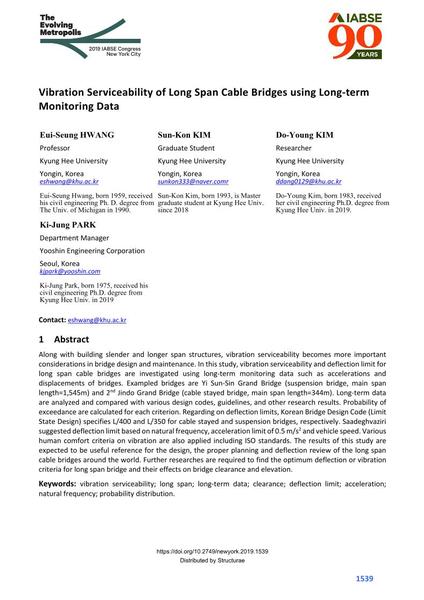Vibration Serviceability of Long Span Cable Bridges using Long-term Monitoring Data

|
|
|||||||||||
Détails bibliographiques
| Auteur(s): |
Eui-seung Hwang
(Kyung Hee University)
Sun-Kon Kim (Kyung Hee University) Do-Young Kim (Kyung Hee University) Ki-Jung Park (Yooshin Engineering Corporation) |
||||
|---|---|---|---|---|---|
| Médium: | papier de conférence | ||||
| Langue(s): | anglais | ||||
| Conférence: | IABSE Congress: The Evolving Metropolis, New York, NY, USA, 4-6 September 2019 | ||||
| Publié dans: | The Evolving Metropolis | ||||
|
|||||
| Page(s): | 1539-1546 | ||||
| Nombre total de pages (du PDF): | 8 | ||||
| DOI: | 10.2749/newyork.2019.1539 | ||||
| Abstrait: |
Along with building slender and longer span structures, vibration serviceability becomes more important considerations in bridge design and maintenance. In this study, vibration serviceability and deflection limit for long span cable bridges are investigated using long-term monitoring data such as accelerations and displacements of bridges. Exampled bridges are Yi Sun-Sin Grand Bridge (suspension bridge, main span length=1,545m) and 2ndJindo Grand Bridge (cable stayed bridge, main span length=344m). Long-term data are analyzed and compared with various design codes, guidelines, and other research results. Probability of exceedance are calculated for each criterion. Regarding on deflection limits, Korean Bridge Design Code (Limit State Design) specifies L/400 and L/350 for cable stayed and suspension bridges, respectively. Saadeghvaziri suggested deflection limit based on natural frequency, acceleration limit of 0.5 m/s² and vehicle speed. Various human comfort criteria on vibration are also applied including ISO standards. The results of this study are expected to be useful reference for the design, the proper planning and deflection review of the long span cable bridges around the world. Further researches are required to find the optimum deflection or vibration criteria for long span bridge and their effects on bridge clearance and elevation. |
||||
